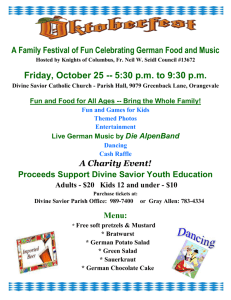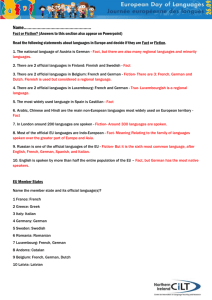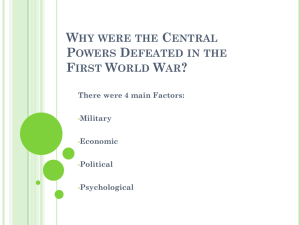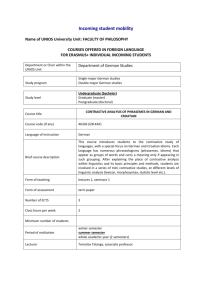German 3002-001
advertisement
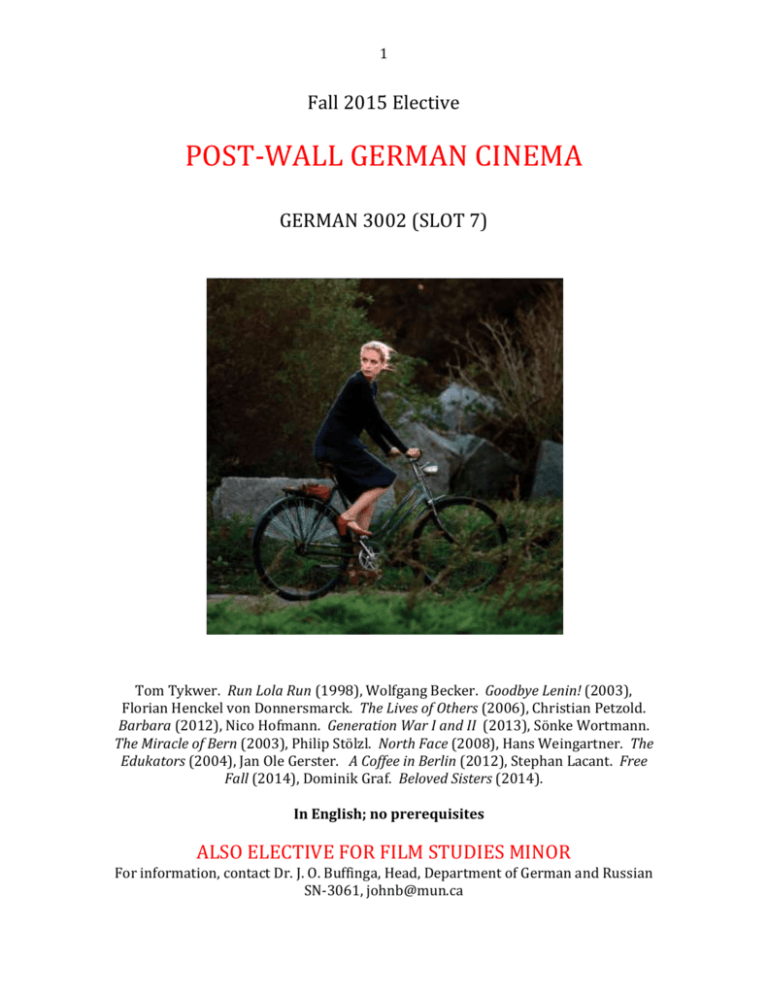
1 Fall 2015 Elective POST-WALL GERMAN CINEMA GERMAN 3002 (SLOT 7) Tom Tykwer. Run Lola Run (1998), Wolfgang Becker. Goodbye Lenin! (2003), Florian Henckel von Donnersmarck. The Lives of Others (2006), Christian Petzold. Barbara (2012), Nico Hofmann. Generation War I and II (2013), Sönke Wortmann. The Miracle of Bern (2003), Philip Stölzl. North Face (2008), Hans Weingartner. The Edukators (2004), Jan Ole Gerster. A Coffee in Berlin (2012), Stephan Lacant. Free Fall (2014), Dominik Graf. Beloved Sisters (2014). In English; no prerequisites ALSO ELECTIVE FOR FILM STUDIES MINOR For information, contact Dr. J. O. Buffinga, Head, Department of German and Russian SN-3061, johnb@mun.ca 2 German 3002: Post-Wall Cinema (1990 to the present) Fall 2015 in Slot 7 (M, W, F 2:00-2:50 in ED-3034B) Instructor: Office: Telephone: Email: Office hours: Dr. J. O. Buffinga SN-3061 864-8826 johnb@mun.ca M, T, W, F 9:00 – 10:00 With the end of the Cold War, the dismantling of the Berlin Wall, the spectacle of unification, the consolidation of the European Union and the introduction of the Euro, German reality has changed dramatically – as has German cinema. A large body of films has appeared in the last two decades, which reflect a reality that is quite distinct from the pre-unification, post-war German reality. This course will explore the new diversified cinematic landscape after the fall of the Wall, tracing fundamental social changes, contradictions and dilemmas of modern German society, and investigate how these film narratives are given visual and aural shape in distinctly new ways. The focus in the course is therefore on both the fundamental social and cultural changes that are taking place in postWall German society and on the manner in which these are influencing and altering film as a visual text, including contemporary German filmmaking techniques. All movies are subtitled and will be screened outside of class time on Monday nights from 7 to 9 in A-1046. Students are strongly advised to watch each movie a second time on their own. Copies of the movies will be placed on reserve in the QEII library. Some scholarly material may be put on reserve, but most of the critical material can be accessed online. Assigned readings will be communicated via D2L, where you will also find other news items related to the course. 3 German 3002 Course Outline F2015 cont’d Detailed Schedule: Sept 9 - 11 Introduction and overview of German cinema Sept 14 – 18 1990’s box-office smash. Tom Tykwer. Run Lola Run (1998) Sept 21 - 25 East and West. German unification. Florian Henckel von Donnersmarck. The Lives of Others (2006) Sept 28 – Oct 2 Nostalgia for the East. Wolfgang Becker. Goodbye, Lenin! (2003) Oct 5 - 9 Psychological and political thriller. Barbara (2012) Oct 14 – 16* Midterm Break Oct 12 – 13. Barbara cont’d. Essay I due Friday, Oct. 16, 2015. Oct 19 - 23 Midterm Exam Monday, Oct 19, 2015. Rediscovery of the social as a narrative focus. Ulli Edel. Baader-Meinhoff Complex (2008) Oct 26 - 30 TV Miniseries I. Nico Hofmann. Generation War I (2013) Nov 2 - 6 TV Miniseries II. Nico Hofmann. Generation War II (2013) Nov 9 - 13 The Mountain Film. Philip Stölzl. North Face (2008) Nov 16 - 20 Coming Out. Stephen Lacant. Free Fall (2014) Nov 23 - 27 German Heritage Cinema. Dominik Graf. Beloved Sisters (2014) Nov 30 – Dec 4 Review. Essay II due Wednesday, Dec. 2, 2015. Christian Petzold. 4 German 3002 Course Outline F2015 cont’d Evaluation Participation: 10% Essay I (6 pages): 10% (due Friday, Oct. 16, 2015)) Essay II (8 pages): 20% (due Wednesday, December 1, 2015) Midterm: 20% (Monday, October 19, 2015) Final Exam: 40% Academic offences: Academic offences shall be deemed to include, but shall not be limited to, the following: - Cheating on examinations or any other tests, theses, assignments, work term reports, projects or internship reports: includes copying from another student's work or allowing another student to copy from one's own work; consulting with any unauthorized person during an examination or test; using unauthorized aids; or knowingly recording or reporting false empirical or statistical data. The work referred to includes examinations, theses, assignments, work term reports, projects, internship reports, or any other tests which are to be used in judging the student's performance in a course or program of study, or on any special tests which the University may offer. - Impersonating another student or allowing oneself to be impersonated: includes the imitation of a student or the entrance into an arrangement with another person to be impersonated for the purposes of taking examinations or tests or carrying out laboratory or other assignments. - Plagiarism: is the act of presenting the ideas or works of another as one's own. This applies to all material such as essays, laboratory reports, work term reports, design projects, seminar presentations, statistical data, computer programs, research results and theses. The properly acknowledged use of sources is an accepted and important part of scholarship. Use of such material without acknowledgment is contrary to accepted norms of academic behaviour. 5 German 3002 Course Outline F2015 cont’d Information regarding acceptable writing or email practices is available through the Writing Centre at www.mun.ca/writingcentre/about/. - Theft of examination papers or other material: includes obtaining by any improper means examination papers, tests, or any other such material. - Use and/or distribution of stolen material: includes the use of material which the student knows to have been improperly obtained and/or the distribution of such material. - Submitting false information: includes falsifying academic forms or records, submitting false credentials, medical or other certificates, or making a false, misleading or incomplete declaration to the University. - Submitting work for one course or work term which has been or is being submitted for another course or work term at this or any other institution without express permission to do so: includes the presentation of an essay, report or assignment to satisfy some or all of the requirements of a course when that essay, report, or assignment has been previously submitted or is concurrently being submitted for another course without the express permission of the professor(s) involved. Failure to follow relevant University/Faculty/School guidelines on ethics.




